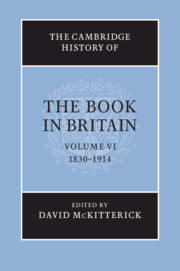Book contents
- Frontmatter
- Introduction
- 1 Changes in the look of the book
- 2 The illustration revolution
- 3 The serial revolution
- 4 Authorship
- 5 Copyright
- 6 Distribution
- 7 Reading
- 8 Mass markets: religion
- 9 Mass markets: education
- 10 Mass markets: children’s books
- 11 Mass markets: literature
- 12 Science, technology and mathematics
- 13 Publishing for leisure
- 14 Publishing for trades and professions
- 15 Organising knowledge in print
- 16 The information revolution
- 17 A place in the world
- 18 Second-hand and old books
- 19 A year of publishing: 1891
- 20 Following up The reading nation
- Bibliography
- Index
- Plate Sections
- References
17 - A place in the world
Published online by Cambridge University Press: 28 March 2010
- Frontmatter
- Introduction
- 1 Changes in the look of the book
- 2 The illustration revolution
- 3 The serial revolution
- 4 Authorship
- 5 Copyright
- 6 Distribution
- 7 Reading
- 8 Mass markets: religion
- 9 Mass markets: education
- 10 Mass markets: children’s books
- 11 Mass markets: literature
- 12 Science, technology and mathematics
- 13 Publishing for leisure
- 14 Publishing for trades and professions
- 15 Organising knowledge in print
- 16 The information revolution
- 17 A place in the world
- 18 Second-hand and old books
- 19 A year of publishing: 1891
- 20 Following up The reading nation
- Bibliography
- Index
- Plate Sections
- References
Summary
While it has been customary to frame the history of the book in terms of the nation-state, the story of the British book trade between 1830 and 1914 is one of increased internationalisation, and no account of even the domestic trade – its structure and organisation, as well as its products and customers – would be complete without a serious consideration of the larger global implications of the period.
Although an overseas trade in books was nothing new – printers had learned to exploit effectively the transatlantic and continental markets throughout the eighteenth century – one of the distinguishing factors of the British book trade in the early part of this period is its role in the extension of a new kind of cultural empire. This was first manifest in a more concerted organisation of the greater British book market in the early years of the nineteenth century, transforming the way in which English, principally London, firms related to the home markets of Scotland and Ireland. With the steady growth of the nation’s overseas interests, by the end of the century its book producers could boast a formidable distribution network constituting an international trade with global reach.
Keywords
- Type
- Chapter
- Information
- The Cambridge History of the Book in Britain , pp. 595 - 634Publisher: Cambridge University PressPrint publication year: 2009
References
- 3
- Cited by



